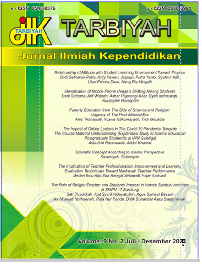Puberty Education from The Side of Science and Religion: Urgency of The Post-Milenial Era
Abstract
To develop an integrated puberty education design in terms of science and religion, this development research was carried out using the 4D method (Define, Design, Develop, Disseminate). The results of the design and development stages were implemented at MTs Muhammadiyah 1 Malang, East Java. These parameters include aspects of student self-awareness, student self-identity. The aspects of students' self-awareness and self-identity obtained a gain score with medium and low levels. This is a challenge for teachers and parents in facing the digital era and the post-millennial generation with such a large flow of information. The urgency of developing puberty education is discussed further in this article.References
Aryani, D. (2015). Komunikasi Antarpribadi Orangtua dan Anak Pada Masa Awal Pubertas Tentang Pendidikan Seks di Kelurahan Mongolaing di Kota Kotamobagu Barut. Acta Diurna, 4(3).
Bte, F., Ghani, A., Lin, S., & Aziz, A. (2017). The Implication of Parenting Styles on the Akhlak of Muslim Teenagers in The Implication of Parenting Styles on The Akhlak of Muslim Teenagers in The South of. Procedia - Social and Behavioral Sciences, 114(June), 761–765. https://doi.org/10.1016/j.sbspro.2013.12.781
Dhin, C. N. (2016). Pembinaan Anak pada Masa Pubertas Menurut Pendidikan Islam. Jurnal Ilmiah Didaktika, 14(1), 102–127.
Faisal, M., Ismail, Z., Puteh, A., & Adib, M. (2012). An Assessment of Teaching and Learning Methodology in Islamic Studies. 59, 618–626. https://doi.org/10.1016/j.sbspro.2012.09.322
Lilis Suryani, Syahniar, Z. (2013). Penyesuaian Diri pada Masa Pubertas. Konselor, 2(1), 136–140. https://doi.org/10.24036/0201321876-0-00
Najmabadi, K. M., & Sharifi, F. (2019). Sexual Education and Women Empowerment in Health : A Review of the Literature. Aras Part Medical International Press, 7(2), 150–155. https://doi.org/10.15296/ijwhr.2019.25
Nasira, R., Ahmad, Z., & Khairudin, R. (2010). Effects of Family Functioning , Self-Esteem , and Cognitive Distortion on Depression among Malay and Indonesian Juvenile Delinquents. 7(2), 613–620.https://doi.org/10.1016/j.sbspro.2010.10.083
Sapiudin. (2019). Scientific Approach based Fikih Learning Model. 4(1), 75–84. https://doi.org/.1037//0033-2909.I26.1.78
Sudan, S. A. (2015). Educating Children on Sexual Matters Based on the Teaching of Islam : The Role of Muslim Parents Salmi Ahmad Sudan, PhD. 2(5), 109–114.
Sujarwati, S., Yugistyowati, A., & Haryani, K. (2016). Peran Orang Tua dan Sumber Informasi dalam Pendidikan Seks dengan Perilaku Seksual Remaja pada Masa Pubertas di SMAN 1 Turi. Jurnal Ners Dan Kebidanan Indonesia, 2(3), 112. https://doi.org/10.21927/jnki.2014.2(3).112-116
Wittmer, F., & Waldhoff, C. (2019). Religious Education in Germany in Light of Religious Diversity: Constitutional Requirements for Religious Education. German Law Journal, 20(7), 1047–1065. https://doi.org/10.1017/glj.2019.76
Yousefzadeh, S., Golmakani, N., & Nameni, F. (2017). The Comparison of Sex Education with and without Religious Thoughts in Sexual Function of Married Women. 7. https://doi.org/10.22038/jmrh.2017.8384
Downloads
Published
How to Cite
Issue
Section
License
Authors retain copyright and grant the journal right of first publication with the work simultaneously licensed under a Creative Commons Attribution 4.0 International License that allows others to share the work with an acknowledgment of the work's authorship and initial publication in this journal.




